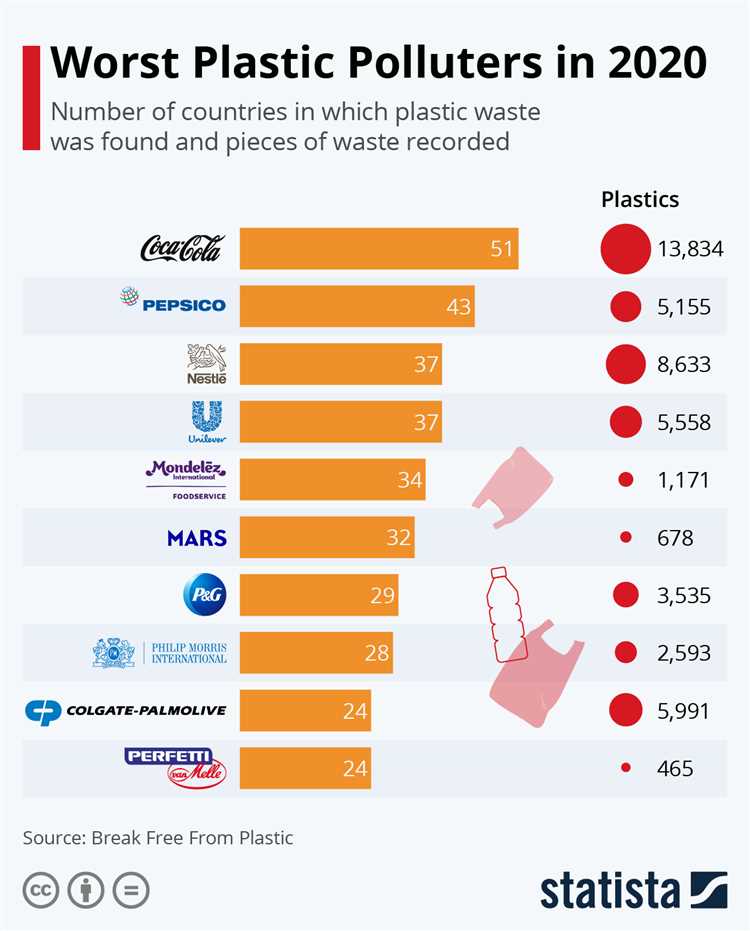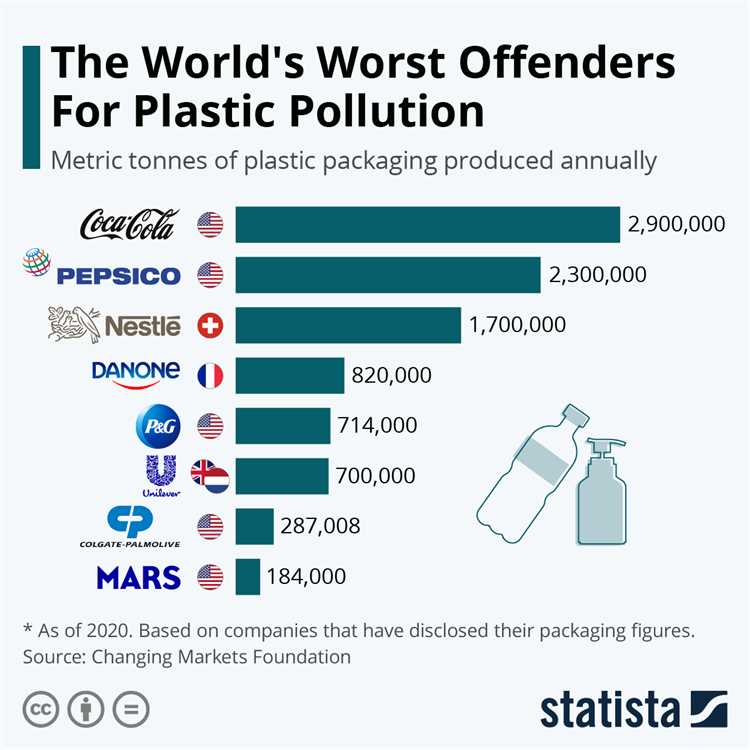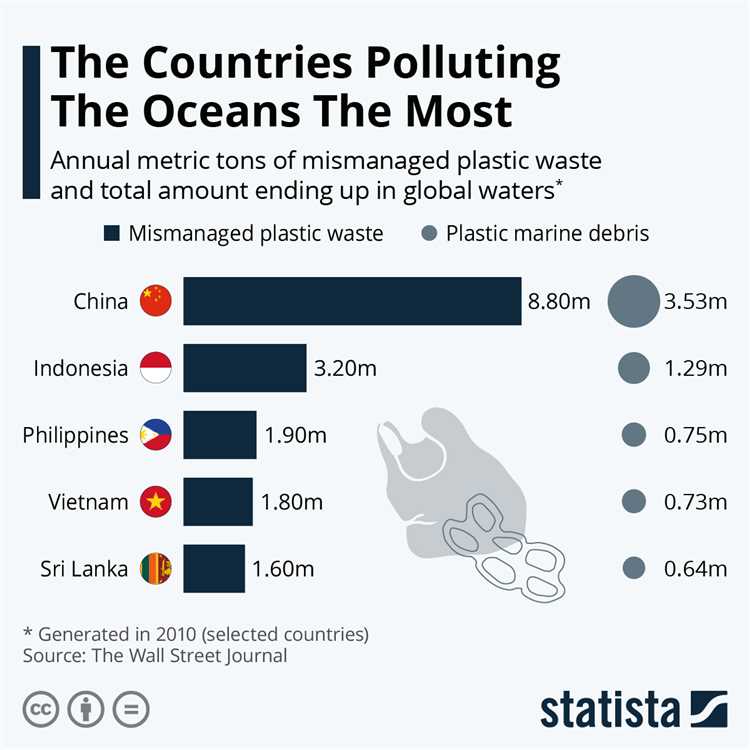In today’s world, plastic pollution has become a major environmental issue. As our consumption of plastic products continues to rise, so does the amount of plastic waste that ends up in our oceans, landfills, and ecosystems. But have you ever wondered which companies are the biggest contributors to this global crisis?
According to recent research and investigations, one name stands out among the rest – [Company Name]. This multinational corporation has been identified as the largest plastic polluter in the world, responsible for producing and distributing vast quantities of single-use plastics that end up as waste.
From plastic bottles and packaging to straws and bags, [Company Name] has had a significant impact on our planet’s plastic pollution problem. The sheer scale of their operations and global reach has made them a top contributor to the plastic waste that is choking our oceans and harming marine life.
It’s important to pause and reflect on the impact that [Company Name] and other major plastic polluters have on our environment. By raising awareness about their practices and holding them accountable, we can work towards creating a more sustainable and plastic-free future.
- Who is the biggest plastic polluter?
- Identifying the top plastic polluters
- The impact of plastic pollution
- Solutions to plastic pollution
- 1. Reduce plastic consumption
- 2. Implement recycling programs
- 3. Support legislation and policy changes
- 4. Encourage innovation
- 5. Promote education and awareness
- FAQ:
- Which company is considered the biggest plastic polluter?
- How did Coca-Cola become the biggest plastic polluter?
- Are there any other companies that are major plastic polluters?
- What are the effects of plastic pollution?
- What are some possible solutions to the plastic pollution problem?
Who is the biggest plastic polluter?
The title of the biggest plastic polluter goes to the Coca-Cola Company, according to a recent audit conducted by Break Free From Plastic. This international movement aims to tackle plastic waste and pollution.
The audit found that Coca-Cola was responsible for more plastic pollution than the next three top polluters combined. The company’s plastic waste was found in 51 countries across four continents, including plastic bottles, bottle caps, and beverage packaging.
While Coca-Cola has made commitments to address plastic pollution, such as setting a goal to collect and recycle one bottle or can for every one it sells by 2030, the audit highlights the urgent need for stronger action to reduce plastic production and improve recycling systems.
It is important to note that Coca-Cola is not the only company contributing to the plastic pollution crisis. Other major polluters include Nestle, PepsiCo, and Unilever. These companies have also made pledges to tackle plastic waste, but significant progress is needed to achieve a plastic-free future.
Addressing the issue of plastic pollution requires a collective effort from companies, governments, and individuals. Implementing sustainable packaging solutions, promoting recycling and reuse, and advocating for stricter regulations are all crucial steps towards reducing plastic pollution and protecting our environment.
It is essential to hold these companies accountable and encourage them to take stronger actions towards reducing plastic pollution and promoting sustainability. By supporting brands that prioritize environmental stewardship and making conscious consumer choices, we can all contribute to a cleaner and healthier planet.
Identifying the top plastic polluters
Plastic pollution has become a major environmental issue, and identifying the companies responsible for the majority of plastic waste is crucial in finding effective solutions. Here are some of the top plastic polluters:
- Coca-Cola: As one of the world’s largest beverage companies, Coca-Cola produces a massive amount of plastic bottles and packaging. Their single-use plastic bottles contribute significantly to plastic pollution.
- PepsiCo: Another major beverage company, PepsiCo is a significant contributor to plastic pollution. Their beverage products, including soda, water, and juices, come in plastic bottles and contribute to the plastic waste problem.
- Nestlé: Nestlé is a multinational food and beverage company that packages a wide range of products in plastic. From chocolate bars to bottled water, their extensive use of plastic packaging adds to the plastic pollution crisis.
- Unilever: This multinational consumer goods company produces a vast amount of personal care and home care products. Many of these products, such as shampoos, soaps, and detergents, come in plastic containers, contributing to the plastic waste problem.
- Procter & Gamble: As one of the largest consumer goods companies globally, Procter & Gamble manufactures a wide range of products packaged in plastic. From cleaning supplies to personal care items, their plastic packaging has a significant impact on plastic pollution.
These companies are just a few examples of the top plastic polluters. By identifying these polluters and holding them accountable, we can work towards reducing plastic waste and finding more sustainable alternatives.
The impact of plastic pollution

Plastic pollution has become one of the most pressing environmental issues of our time. The extensive use of plastic in our everyday lives has resulted in the accumulation of vast amounts of plastic waste, which has devastating consequences for our ecosystems and wildlife.
One of the major impacts of plastic pollution is the harm it causes to marine life. Plastic debris, such as bags, bottles, and microplastics, often end up in rivers and eventually make their way into the oceans. Marine animals mistake plastic for food and ingest it, leading to internal injuries, starvation, and even death. Additionally, entanglement in plastic waste can trap and suffocate marine animals, further endangering their populations.
Plastic pollution also affects terrestrial ecosystems. As plastic waste breaks down into smaller pieces, it can contaminate soils and water sources, posing a threat to both plants and animals. The chemicals present in plastic, such as bisphenol A (BPA) and phthalates, can leach into the environment and have harmful effects on ecological balance and human health.
Furthermore, plastic pollution has significant economic implications. The cleanup and management of plastic waste require substantial financial resources. Coastal communities heavily affected by plastic pollution often suffer from reduced tourism and decreased fishery yields, impacting their local economies.
To address the impacts of plastic pollution, it is crucial to reduce plastic consumption, improve waste management systems, and promote the use of sustainable alternatives. Governments, businesses, and individuals must work together to implement effective measures that reduce plastic waste and protect our environment for future generations.
It is essential to raise awareness about the impact of plastic pollution and the urgent need for sustainable solutions. Each individual can make a difference by choosing reusable alternatives, properly recycling plastic waste, and advocating for policies that promote a circular economy.
Together, we can combat plastic pollution and create a cleaner and healthier planet for all.
Solutions to plastic pollution

Plastic pollution is a global environmental issue that requires immediate attention and action. To mitigate the impact of plastic waste on our planet, several solutions have been proposed and implemented.
1. Reduce plastic consumption
One of the most effective ways to combat plastic pollution is to reduce our overall consumption of plastic products. This can be achieved by using reusable alternatives such as cloth bags, stainless steel water bottles, and glass containers. By making conscious choices to avoid single-use plastics, we can significantly decrease the amount of plastic waste generated.
2. Implement recycling programs
Recycling is a key strategy in managing plastic waste. Governments and organizations can establish comprehensive recycling programs that educate the public about recycling practices and provide convenient recycling facilities. Initiatives like plastic bottle deposit schemes can incentivize recycling and promote a circular economy approach.
3. Support legislation and policy changes
Advocating for legislation and policy changes is essential to tackling plastic pollution. Governments can enact laws that ban or restrict the production and use of certain plastic products, such as single-use plastic bags and straws. Implementing extended producer responsibility programs can also hold manufacturers accountable for the end-of-life management of their plastic products.
4. Encourage innovation

Investing in research and development of innovative solutions is crucial for addressing plastic pollution. Scientists and engineers are exploring alternative materials to replace single-use plastics, such as biodegradable or compostable polymers. Additionally, advancements in waste management technologies, such as improved recycling systems and plastic-to-fuel conversion, can help reduce the environmental impact of plastic waste.
5. Promote education and awareness

Creating awareness about plastic pollution and its detrimental effects is vital to driving behavioral change. Educational campaigns, workshops, and media initiatives can inform the public about the importance of reducing plastic consumption and proper waste management. By fostering a sense of responsibility and environmental consciousness, individuals can actively contribute to reducing plastic pollution.
| Solutions | Description |
|---|---|
| Reduce plastic consumption | Using reusable alternatives and avoiding single-use plastics. |
| Implement recycling programs | Educating the public and providing convenient recycling facilities. |
| Support legislation and policy changes | Enacting laws to ban or restrict plastic production and use. |
| Encourage innovation | Investing in research for alternative materials and waste management technologies. |
| Promote education and awareness | Informing the public about the impact of plastic pollution and fostering behavioral change. |
FAQ:
Which company is considered the biggest plastic polluter?
The biggest plastic polluter in the world is Coca-Cola. According to a report by Break Free from Plastic, Coca-Cola was identified as the top plastic polluter for the third consecutive year.
How did Coca-Cola become the biggest plastic polluter?
Coca-Cola became the biggest plastic polluter due to its large production and distribution of single-use plastic bottles. The company produces billions of plastic bottles each year, many of which end up in landfills or as litter in the environment.
Are there any other companies that are major plastic polluters?
Yes, aside from Coca-Cola, other major plastic polluters include PepsiCo, Nestle, Unilever, and Mondelez International. These companies also produce huge amounts of single-use plastic packaging that contribute to the global plastic pollution problem.
What are the effects of plastic pollution?
Plastic pollution has a wide range of negative effects on the environment. It harms marine life, as animals can get entangled in plastic or mistake it for food. It also contaminates water sources and soil, leading to further environmental degradation. Additionally, the production and disposal of plastic contribute to greenhouse gas emissions and climate change.
What are some possible solutions to the plastic pollution problem?
Some possible solutions to the plastic pollution problem include reducing the production and use of single-use plastic packaging, promoting recycling and circular economy practices, and investing in alternative materials and packaging designs that are more environmentally friendly. Governments, businesses, and individuals all have a role to play in tackling this issue.